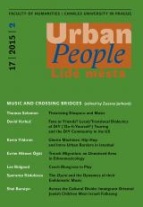Across the Cultural Divide
Immigrant Oriental Jewish Children Meet Israeli Folksong
DOI:
https://doi.org/10.14712/12128112.3404Klíčová slova:
Israeli folksong, immigration, melting pot, cross-cultural music perceptionAbstrakt
Many songs created in pre-State Israel incorporated certain Oriental elements, but their overall stylistic slant, like that of other contemporaneous local cultural products, was largely Occidental. The radical demographic change caused by a massive immigration of Jews from Middle Eastern and North African countries to the new state created enormous pressure to absorb the newcomers both physically and culturally. The ensuing melting pot policy declared by the young state as its supreme national task proved unsuccessful. This failure had many reasons, not least of them the condescending attitude of the absorbing establishment and its inability to fathom the sociocultural processes involved in such a colossal national project. Against this background, I examine in this article the encounter of immigrant Oriental children with Israeli folksong, mainly from the perspective of musical perception and cultural conditioning. In the 1930s and 1940s, ingrained musical perceptual habits made European-oriented audiences insert variants into the newly composed modal, mildly Oriental songs they used to sing. In the 1950s, however, the musical perceptual habits of immigrant Oriental children hindered them from embracing Israeli folksongs created mainly by composers of Eastern European origin.
Stahování
Publikováno
Jak citovat
Číslo
Sekce
Licence

Tato práce je licencována pod Mezinárodní licencí Creative Commons Attribution-NonCommercial-NoDerivatives 4.0.


